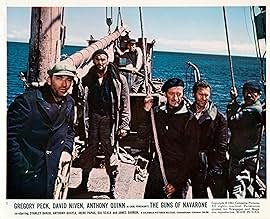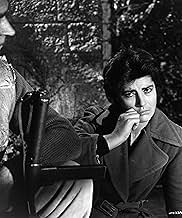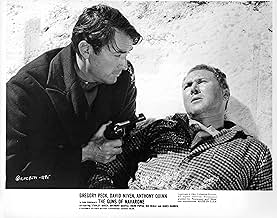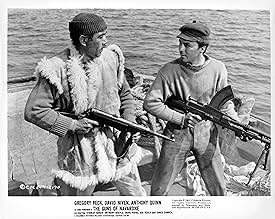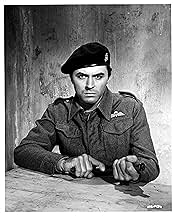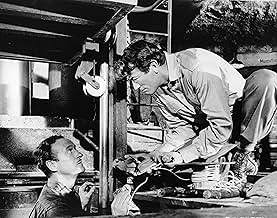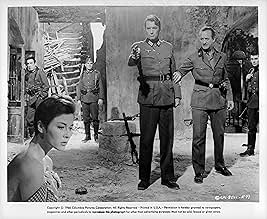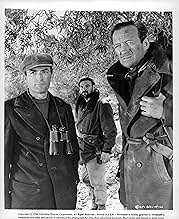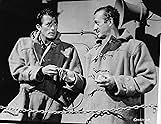Durant la Seconde Guerre mondiale, un commando est chargé d'une périlleuse mission : détruire deux énormes canons allemands situés sur l'île de Khéros.Durant la Seconde Guerre mondiale, un commando est chargé d'une périlleuse mission : détruire deux énormes canons allemands situés sur l'île de Khéros.Durant la Seconde Guerre mondiale, un commando est chargé d'une périlleuse mission : détruire deux énormes canons allemands situés sur l'île de Khéros.
- Réalisation
- Scénario
- Casting principal
- Récompensé par 1 Oscar
- 4 victoires et 12 nominations au total
Avis à la une
The team put together here couldn't be more incongruent with each other. Gregory Peck's world-class mountain climber who becomes the team's reluctant CO, David Niven's hot-tempered, authority-defying sapper, Anthony Quinn's Greek ex-Colonel who has promised to kill Peck at war's end, Stanley Baker's weary soldier who's tired of the unending slaughter, a young Greek national who wants more and more of it...the real miracle is that they manage to get as far and as well as they do. For every step forward, they wind up paying for it. Be it in blood, moral anguish, or pain, no one comes out of this mission unchanged or unscathed. I honestly feel that it is this theme of sacrifice that is the key to the greatness of "The Guns of Navarone".
I first saw this film in the theatre at age 11. I've seen it dozens of times since. It's not Ben-Hur, nor even Citizen Kane. It's just my favorite film.
This simplistically summarizes the moral dilemmas at the heart of Alistar MacLean's classic novel and the superb Carl Forman film from which followed. The Guns Of Navarone at first looks like a basic mission - in 1943 a key channel in the Aegean Sea is commanded by two gigantic German siege batteries on the island of Navarone; these guns prevent the reinforcement of a British island garrison nearby, and if the garrison falls, it will persuade Turkey to join the Axis powers, an outcome Berlin is counting on as the war in Russia has turned against it with the defeat at Stalingrad.
The guns cannot be bombed by air, despite heroic efforts by the RAF, and so is brought in a key Allied operative who has been working in occupied Crete since its fall to the Germans in 1941. Captain Keith Mallory not only can speak the languages of the area with superb fluence, he is "Keith Mallory, the Human Fly," the best mountaineer in the world. He feels he cannot climb the 400 foot precipice atop which the German batteries sit, but he likes nothing better than "a well-organized setup" upon seeing that he has no choice.
With the help of his closest combat comrade Stavro (Anthony Quinn), Mallory is assigned with Major Roy Franklin to ferry British commandos - one of the a wise-cracking explosives expert, Corporal John Anthony Miller (David Niven)- on the perilous journey to the back door of Navarone. But the infiltration is fraught with danger, and when Franklin is badly injured, the real crest of the story unfolds, the moral dilemmas of the team as they must complete the mission while deciding how to handle an injury they cannot treat.
And as if that were not enough, one of the Greek resistance operatives helping the team turns out to be a traitor after Miller finds his explosive equipment has been tampered with. It leads to yet another of the several arguments that ensue through the film between Miller, the soldier who does not want the responsibilities involved, and Mallory, who is determined to finish the job. While one of the arguments doesn't make much sense - Miller is horrified when Mallory admits lying to Roy Franklin so that upon eventual capture Franklin will give away inaccurate information; this is by far the most humane solution to the intolerable dilemma the team has faced - overall the clash between Mallory and Miller adds enormously to the film's tension, thanks in no small part to the excellent performances of Gregory Peck and David Niven.
The sets and props of the film are superb, and overcome the comparative cheesiness of some of the special effects.
What I noticed on first viewing was how quiet it is. Many scenes take place without dialog or score, merely background noises like wind, feet crunching gravel, and the like. Some of the tensest scenes are made more so by our hearing only what the characters would hear. For example, early on in the film, the lead characters undergo a storm at sea and approach a dangerous narrows, and until the scene's climax, all we hear are howling wind, driving rain, and slamming waves.
A musical score tells viewers how they are supposed to feel and often telegraphs shifts in plot or mood. As used in this film, the absence of music heightens the drama and makes the action more immediate. What score there is is thus more effective, earning its composer an Academy Award.
Le saviez-vous
- AnecdotesThis film was the only time that David Niven, a life-long non-smoker, ever smoked cigarettes on-screen.
- GaffesWhen the Germans are searching the gun positions for explosives, German soldiers are using mine detection equipment and sweeping the tracks leading up to the guns. This is a useless activity since the detection equipment is a metal detector and would give off a signal due to the steel rails.
- Citations
Mallory: Can you do anything at all?
Corporal Miller: I don't know. There's always a way to blow up explosives. The trick is not to be around when they go off. But aren't you forgetting something? The lady. As I see it we have three choices. One we can leave her here but there's no guarantee she won't be found, and in her case they won't need a truth drug. Two, we can take her with us, but that would make things worse than they are already. And three... well, that's Andrea's choice, remember?
Mallory: You really want your pound of flesh, don't you?
Corporal Miller: Yes, I do. You see, somehow I just couldn't get to sleep.
Mallory: Well, if you're so anxious to kill her, go ahead!
Corporal Miller: I'm not anxious to kill her, I'm not anxious to kill anyone. You see, I'm not a born soldier. I was trapped. You may find me facetious from time to time, but if I didn't make some rather bad jokes I'd go out of my mind. No, I prefer to leave the killing to someone like you, an officer and a gentleman, a leader of men.
Mallory: If you think I wanted this, any of this, you're out of your mind, I was trapped like you, just like anyone who put on the uniform!
Corporal Miller: Of *course* you wanted it, you're an officer, aren't you? I never let them make *me* an officer! I don't want the responsibility!
Mallory: So you've had a free ride, all this time! Someone's *got* to take responsibility if the job's going to get done! You think that's easy?
Corporal Miller: [shouts] I don't know! I'm not even sure who really is responsible any more.
- Crédits fousOpening credits prologue: The first day 02.00 Hours An Allied Airfield somewhere in the Middle East
- Versions alternativesTo receive a 'U' certificate the original UK cinema version was overdubbed to remove all of Barnsby's uses of the word 'bloody' (the word was replaced with the less offensive 'ruddy'), and this same print appeared on early video releases. The film was restored in 1993 and all later widescreen releases feature the full unedited version.
- ConnexionsEdited into L'ouragan vient de Navarone (1978)
- Bandes originalesKaragouna
(uncredited)
Traditional
Meilleurs choix
Détails
- Date de sortie
- Pays d’origine
- Langues
- Aussi connu sous le nom de
- Los cañones de Navarone
- Lieux de tournage
- Acropolis of Lindos, Rhodes, Grèce(meeting point of party with Maria and Anna)
- Sociétés de production
- Voir plus de crédits d'entreprise sur IMDbPro
Box-office
- Budget
- 6 000 000 $US (estimé)
- Montant brut mondial
- 20 616 $US
- Durée
- 2h 38min(158 min)
- Mixage
- Rapport de forme
- 2.35 : 1


